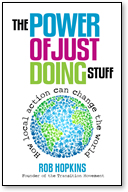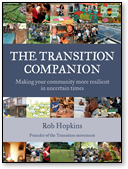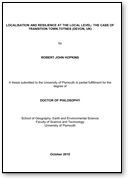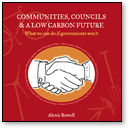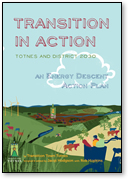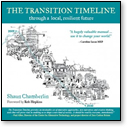Monthly archive for June 2014
Showing results 1 - 5 of 15 for the month of June, 2014.
30 Jun 2014
The Transition movement sometimes claims to be apolitical, but I think that politics can be defined as any issue in which there is a conflict of resources, and a decision to be made on how to allocate them. Although Transition isn’t party political, it’s a global social movement that seeks to create massive social and economic change. We’re positioning ourselves as an alternative to a failing political, social and economic system and rejecting the ability of those currently holding power (the capacity or ability to direct or influence the behaviour of others or the course of events) to do what is necessary to save our planet. If that isn’t political, I don’t know what is!
I don’t feel that steering clear of alignment with political parties and election makes Transition non-political. It feels similar to me to autonomous or community anarchism, which propose to build an old world in the shell of the new. Generally this refers to the process of creating alternative and autonomous structures of direct democracy, ready to step in when the old world of capitalism and the structures of the state crumble.
Transition’s central aims are environmental ones, but they also rely on a ‘crisis’ to interrupt the old economic structures and make a change to the new world – in this case created by Transition – inevitable. Of course we hope that the process of change will be a positive one, and that we move into a hopeful new future with ‘resilient’ local structures in place to ensure we still have food, energy and everything else we truly need.
But there is a gap here. Economic crises, as we have seen in the last few years, do not necessarily bring the current system crashing down. Economic systems frequently reinvent themselves, becoming harsher, even less equal as those who control fiscal and monetary policy and banking find new ways to deal with capitalism’s regular crises. Although many of us assume that the multiple crises brought about by climate change will result in a substantially different economy in the long term, this may not be the case.
 Transition is not simply an environmental organisation that aims to enable communities to treat our planet more gently, but a multi-faceted movement underpinned by the principles of permaculture – ‘Earth care, people care and fair shares’ – principles that encompass our economic and educational systems, how we live and our social relationships.
Transition is not simply an environmental organisation that aims to enable communities to treat our planet more gently, but a multi-faceted movement underpinned by the principles of permaculture – ‘Earth care, people care and fair shares’ – principles that encompass our economic and educational systems, how we live and our social relationships.
In several cities in the UK, Transition initiatives have set up currencies, in others co-housing projects, and in many, social enterprises and community-owned businesses. This is a real life movement, already creating alternative structures that co-exist alongside mainstream economic and social ways of doing things.
In the political sphere, the Transition Network lobbies national governments to change and enable environmentally progressive projects. And, quite sensibly, many local Transition initiatives have a relationship with councils and other local government institutions that can be a helpful enabling force in realizing and event funding our projects. In recent years some Transitioners have sought election to local government in order to enact greener policies.
So is the right thing to do, to continue this, perhaps even to align with the political party that most shares our values – the Greens? Personally, I don’t think so – a strength of Transition is that it is non-party political, with the possibility of engaging those from a variety of political backgrounds, and those who distrust mainstream politics (I don’t necessarily think we are succeeding at doing this already, but the potential is there).
But we do, I believe, need a clear discussion about what the Transition project seeks to achieve. Are we content with the status quo, just more ecologically sustainable? Recent history has demonstrated that power does not disappear or dissolve, and those who hold it do not easily let go. Our structures of governance tend to resist becoming more directly democratic – they only do so when fought for.
Our current economic model is based on the concept of infinite growth, absorbing and co-opting anything that challenges it. Businesses and governments are perhaps able to adopt the models of sustainability (renewable energy, local and organic agriculture, different models of transport etc.) that Transition develops, but not the whole picture we hope to achieve. It is difficult for example, to see how the ‘Gift Economy’ can become central and permanent (and not just a temporary reaction to economic downturn, or a pleasant sideline to the ‘real’ economy), without a challenge to existing power structures.
Some of what Transition is suggesting and the models we are building can be absorbed into the current economic and social way of doing things. The parts that cannot are most likely the ‘people care’ and ‘fair shares’ parts of the permaculture model. In order to combat this, I believe that Transition requires an analysis of power, and an honest discussion about what we can and hope to achieve.
Sara Ayech is the co-ordinator of Transition Dartmouth Park in London, and is a Social Reporter (among other things!).
Read more»
28 Jun 2014
What would you say were the defining characteristics of Labour politics in relation to sustainability and climate change?
The challenges of protecting our natural environment and dealing with a changing climate are immense. When it comes to government, actions speak louder than words – and Labour has a good record on protecting our natural environment, and opening it up for the public to enjoy. The Attlee Government legislated for our first national parks, nature reserves and Sites of Specific Scientific Interest (SSSI). The last Labour Government creating two more national parks in the New Forest and South Downs. We established the right to roam, and gave better protection to wildlife.
We doubled the amount of electricity we generated from renewable sources, passed the Climate Change Act – a world first – and established the UK as a world leader in offshore wind and carbon capture and storage. If we’re elected next year we’ve said we will set a target to decarbonise our power supply by 2030, support the expansion of low-carbon energy such as renewables, nuclear and carbon capture and storage, and increase our ambition on energy efficiency.
Labour’s position, as I understand it, is currently in favour of fracking. Is fracking really a defensible approach in the context of the urgent need to drive down emissions?
There are important regulatory questions which must be answered before large-scale extraction can begin. Tory ministers have chosen to ignore legitimate environmental concerns rather than address them and provide safeguards for communities. Only by fully addressing legitimate environmental and safety concerns about fracking with robust regulation, comprehensive monitoring and strict enforcement will people have confidence that the exploration and possible extraction of shale gas is a safe and reliable source that can contribute to the UK’s energy mix.
In March 2012 Labour set out six environmental conditions for the shale gas regulatory regime. The Government has conceded on 4 of the 6 points. They have not included the baseline survey of methane being assessed prior to drilling, and they have not specified that the monitoring activity should take place over a 12 month period. Many other concerns remain, particularly regarding the effectiveness of the monitoring process and the capacity of the relevant bodies to undertake that monitoring.

If it can be developed safely, shale gas is likely to be used in our energy mix in two important ways. Firstly, in heating our homes. 80% of homes in the UK rely on gas for their heating and this is likely to be the case for many years to come. Secondly, for electricity generation. As a party, we’re committed to decarbonising the power supply by 2030 in order to keep on course to meet the target of reducing CO2 emissions by 80% by 2050.
In practice, that means we will need to bring forward substantial investment in low-carbon electricity generation, including renewables, carbon capture and storage and nuclear. However, within this legally binding framework, there will still be a place for gas – at the very least as back-up generation to manage the intermittency of energy sources like wind and solar, which do not generate all the time and which can see quite dramatic changes in their output in a very short space of time.
For this reason, fracking is unlikely to lead to an increase in the total amount of fossil fuel burnt for electricity for generation; it will simply mean more of the gas we do use is produced in this country, rather than overseas. The independent Committee on Climate Change, which is responsible for advising Parliament on how we meet our carbon emissions reduction targets, has also said that shale gas can be developed within our climate targets.
Do you see any incompatability between economic growth and tackling climate change on the scale required? Do you see any evidence from anywhere in the world that has successfully decoupled growth and emissions?
On the one side are those who argue that Government-led action on climate change is a threat to growth – an unnecessary burden on business – a lead weight around the neck of UK plc. That view says that economic growth is not possible if we tackle climate change. The likes of the present Chancellor not only believe that the green agenda is bad for business, bad for jobs and bad for growth, but actively revel in their contempt for environmental protection. According to this view, environmental policies are a luxury that can only ever be afforded when times are good. It is an argument, I believe we should firmly reject.
On the other side, there is the view that all economic growth threatens to deplete the world of resources; that the need to protect the planet means that advanced societies should break with their addiction to the motor car; end holidays abroad; and focus on quality of life rather than material consumption. The West, they believe should accept a lower standard of living in the interests of the planet. Both views share one central premise – that economic growth and environmental sustainability are inherently irreconcilable. One forsakes the environmental policies; the other forsakes the growth. I reject both arguments.
History shows us that only economic growth spreads wealth and prosperity and with it the means to reduce poverty and civilise societies. There is a path between untrammelled growth at all costs; and a zero growth world. We can grow our economy and benefit the planet; we can provide for our citizens and meet their aspirations without ruining our planet. It is not a zero sum game.
The current government has published a Community Energy Strategy. How important do you see community renewable energy schemes as being, and what would a Labour government do to support and enable it?
As a new energy industrial revolution unfolds, future technologies, sources of renewable and low carbon energy and their application offer more scope than ever to challenge the existing market, reshape relationships and create new agents of delivery. This is not to underestimate, or be naive, about our energy requirements and the role of large scale energy generation and delivery. Nor is it to ignore nuclear and the important role it can play in meeting Labour’s Climate Change targets, set out in the 2008 Climate Change Act, accepted by the Coalition Government.
However we cannot neglect the potential for individuals and communities to create and save energy. In truth there are plenty of examples both here and abroad which demonstrate the potential of community energy as a low carbon driver. Important as that is, it is equally about empowering people to take more control over their use of energy and at what price.
Do you see climate scepticism as a growing or a declining force within Westminster?
Labour has always warned that climate change threatens national security because of the consequences for destabilisation of entire regions of the world, mass migration of millions of people and conflict over water or food supplies. The flooding earlier this year showed that this is a national security issue in our own country too with people’s homes, businesses and livelihoods under attack from extreme weather. Because of political division in Westminster we are sleepwalking into a national security crisis on climate change. The science hasn’t changed, and recent events here at home and overseas should serve as a wake-up call for us all. The climate change consensus that once existed has frayed. Labour stands ready to work with good people from all parties to do what is necessary.
From your perspective, is the challenge of staying below 2 degrees best served by being in or out of Europe?
There is no doubt that Europe does now face a significant reform ‘moment’ that must be seized, and that Europe has to be made to work better for Britain. But our interests, including on the environment, are undoubtedly better served by staying in the European Union. Lots of the problems we face do not respect national borders – so to reduce our carbon emissions and prevent dangerous climate change, we need to see co-ordinated action between different countries. Being in the EU helps us to do that and it gives us greater clout when it comes to international negotiations with the rest of the world.
The Conservatives are planning to introduce a policy to ban all onshore wind turbines if it wins the next election. What would Labour do?
I don’t believe in setting arbitrary caps for the cheapest and most developed form of renewable electricity – and the next Labour Government will give onshore wind the support it deserves.
If you are elected, and end up representing the UK at COP21 in Paris next December, what can community groups, such as Transition, do to best support you as Environment Minister, and to help you feel empowered to take bold and meaningful action?
Government can lead the effort, but all of us – business, trade unions, councils, civil society, communities, families and individuals – must work together to imagine and build the country we want and the kind of planet we want to live on. Civil society can help lift the ambitions of politicians and Governments. Each one of us has a part to play, and only by uniting will we realise those ambitions.
Caroline Flint is Labour MP for the Don Valley, and Shadow Secretary of State for Energy and Climate Change.
Read more»
27 Jun 2014
Peter MacFadyen is a founder of Sustainable Frome (a Transition initiative) and Director of Frome’s new Renewable Energy Co-op. He has worked with Comic Relief for 20 years, and was part of a group of Independents who, as Independents for Frome, ran for the town council and got in, a tale documented in his new book, Flatpack Democracy. During June, he shared his 10 Tips for Reinventing Local Democracy. Here they are, all gathered together in one place.
List of Tips
1. Celebrate!
2. Participate!
3. Engage!
4. Big Issues and Sustainability!
5. Ambition and Connection!
6. Food!
7. Tipping points and common sense!
8. New parallel systems!
9. Laughter!
10. Revolution!
Tip 1: Celebrate!
“The Transition Town model uses celebrate very much in its core already, and I think there’s a really clear role for Transition Town groups to be demonstrating the importance of lightness and laughter and celebration. I think councils have got very confused often with the difference between solemn and serious, something John Cleese talks about a lot. We think that we can’t be serious unless we’re solemn. But actually, councils can fund things like Big Lunches, community garden events, street parties, and there’s something that has come up in Frome called the Mens’ Shed Project, which is something that’s very widespread in Australia.
Those sorts of things, which would involve a lot of lightness, laughter and celebration, the role of the Transition Town movement is to really offer those to councils and then support them in carrying them out. To bring a lightness and a celebratory atmosphere to what happens in a community”.
Tip 2: Participate!
“This is about demonstrating and introducing new ways of doing things. One of the things that councils do in my experience is often have a row of men in suits who sit there and then give a speech and then might ask for some opinions from the floor and that’s called participation. Often it’s also called “consultation”, which is even worse. The Transition movement’s got really engaged with things like World Café, Open Space, and then of course there’s the language of the Occupy movement and People’s Assemblies.
There’s a real role for Transition groups to be doing those things in their communities, so to be doing World Café, Open Space proper engagement, proper participation, and effectively embarrassing councils into being forced to revitalise local democracy because people simply won’t put up with that row of men in suits”.
Tip 3: Engage!
I became involved with the Town Council because coming from, effectively, a Transition Town, I engaged with the council, asked about their green strategy, there wasn’t one, so I tried to push them into having one. In the same way, people can be asking councils, so they have an ethical strategy, what happens to their compost, have they ever heard of Incredible Edible?
It’s about asking, pushing, demanding. It’s actually about getting things on agendas and then checking that they’re minuted afterwards. There’s a bit of work in there, and there might be some sort of press stuff, so again it’s about embarrassing people. The Transition Town demands action on closed allotments, things like that where politicians don’t like anything that’s publicly pushing them in a direction. So ‘engage’ is about a local Transition group actually taking the time to go to the council and then asking these questions and then pushing them a bit.
Tip 4: Big Issues and Sustainability!
The Transition Town’s history comes from Peak Oil and climate change and concerns around those things, and I think it’s incredibly important that those things are right up there on the agenda, even in small towns and small villages. I think it’s false that just because you live in a small town with a population of a couple of thousand these issues don’t matter.
Of course they do, and therefore again it’s one of these things where Transition Towns need to keep at it. Keep having those talks. Keep showing those films. Get involved with things like anti fracking. Frome is a ‘frack-free zone’, the council voted for it to be a frack-free zone. In one sense it’s completely meaningless: nobody’s going to frack in Frome. But on the other hand, it keeps it in the public awareness and raises those issues that are really important.
So the role of the Transition Town is to put big national issues on the agenda and keep them there and make sure that councils engage with them.
Tip 5: Ambition and connection.
It’s about linking to the outside world. It’s about moving on from the dog sheds and bus shelters that I mentioned earlier. It’s really saying that a council must be bigger. Frome Town Council’s new Neighbourhood Plan has One Planet Living at its core. So we’ve raised all the issues of the fact that we live on one planet. That’s a way into reduce, reuse, recycle and then maybe the council supporting things like a Restart project.
Again, it’s pressurising the council. Have they got things like a Fairtrade policy or are they part of the Fairtrade movement? Is there an ethical policy? We’ve just got a new ethical policy which interestingly clashes immediately with the pension schemes that all the staff have which are run at a national level, where the investment strategy includes investing in tobacco and arms and Monsanto.
The Transition Town movement is about challenging, pushing but also making things easy possibly. So for example, we’ve twinned all the public toilets in Frome with the community toilet twinning scheme. All the toilets are twinned with one in Africa, which is a scheme you can Google and look up. This costs sixty quid and that fundraises for a toilet in Africa. But the publicity that comes off that is saying we’re not just a little place that does its own little thing. We have ambitions and we want to be connected to the wider world, and I think that’s really important and something which the Transition movement can constantly be reminding the council and councillors, that it’s one world.
Tip 6: Food
Food is already massive in the Transition Town movement. A lot of things relate around food, I think. It’s a fantastic way to bring people together. I’ve touched on things like the Big Lunch and so on before. But there’s a link to councils that can come through that, I think, which is partly to poverty. In Frome we’re now supporting a box scheme and one of the things that’s come out of discussions around poverty in Frome has been a whole new charity and a whole new group called Fair Frome, which is essentially focusing around food. That’s then linked into community meals and training around food, linked to the food boxes, leads into allotments, health and all those sorts of things.
What I’ve just described is part council agenda and part what most Transition Town movements do. Incredible Edible are brilliant I think in lots of ways. Most of the main flowerbeds in Frome are now run by an Incredible Edible group as I know they are in many Transition Town places. That’s a fantastic example of how everybody gains: the town council gets cheaper maintenance of their flower bed, the group gets everything out there. It’s just win win all over the place.
So food is really, really important. In a slightly personal way, I bake biscuits for the council meetings that I chair. And it’s really interesting how that broke down a whole formality, just by starting a meeting with tea and coffee and biscuits that come from a recipe that my mum made. It makes the whole thing more human and acceptable, and that’s exactly the kind of thing that Transition groups are doing all the time.
Tip 7: Tipping Points and Common Sense
Most of what the Transition movement does, really everything that it does, is common sense. When people understand it, they’ll understand that. It’s easy to get bogged down, to run out of energy, to get a bit depressed about everything that we’re trying to do, but I think it’s really important for everybody to do the little things that they can, whether it’s one woman’s window box or another’s allotment.
Tipping points don’t come at 50%. In other words, at a certain point in a community, enough people will be doing things, and then everybody goes “oh right, we get it”. Men and women are social animals. Much of what Transition Town is about is about rebuilding social links. That’s what councils love to do, and actually we can make it easy for them.
They love claiming ownership of things, so keeping doing things, keeping on in there, and even when it feels like it’s all an endless slog, it’s really important to make sure that councils see that because at a certain point, the tipping point comes and the whole thing suddenly goes ‘buddumph’ and you get a Totnes or a Frome.
Tip 8: New parallel systems.
I increasingly believe that the upper levels of the political system are not going to change. That ultimately turkeys will never vote for Christmas. The 23 out of 27 multimillionaires in the cabinet are never going to change the system. Localism, neighbourhood plans and so on are a brilliant philosophy, a great idea, but it’s not going to happen in the timescale that we need.
So what we need is Transition Towns to be running parallel systems which effectively come up and swamp the so-called democracy and make it irrelevant. The best example I can think of is photovoltaics in Germany. You’ve got so much private and small-scale photovoltaic production going on that actually the German equivalent of the Big 6, at some point they won’t be able to sell their electricity, because there’s so much being made off roofs that theirs has no value. Another example perhaps is the sharing of music that happens now on the internet, where the corporate music industry has effectively been completely undermined by the people.
I think with social media and new ways of engagement, particularly, Transition Towns can be part of coming up and around the system and just making it irrelevant. Enlightened councils can support this process. What we’re trying to do in Frome is to support those kinds of movements and accept less and less power for the council. The council does less and less decision making and more and more listening to what people really want. New parallel systems are what’s wanted.
Tip 9: Laughter
Laughter. Now in a way this is a little bit of a cheat, because it goes all the way back to the beginning with celebrate in a way. I’ve been really inspired by Beppe Grillo’s Five Star movement in Italy. The five stars, incidentally, are water, sustainable transport, sustainable development, connectivity and environmentalism. What could be more Transition Town than that?
It’s full of environmentalism and sustainable things. He’s a man who’s come from completely outside the system, a stand-up comic who took 25% of the votes in the last presidential election in Italy. His three steps for raising popular engagement are laughter, information and political action. The real role for Transition Towns is to up the game in terms of laughter, celebration, lightness which will reinvigorate local engagement and draw people in, especially younger ones. It’s based on this: that we’ll get the opportunities for revolution and all the things I mentioned earlier.
The Transition Movement has a real role in creating a situation where we behave in politics and in local democracy in the way that we behave in life. So the things that excite us and enthuse us in life, like laughter, why can’t we have them in the meetings that we have that are meant to be serious and solemn? There’s a real role there for Transition Town movements to make that happen.
Tip 10: Revolution
Anyone deeply involved in the ideas of the Transition Town movement will have a sense of urgency. At a certain point, if all the demonstrating, sharing, offering, all the parallel systems and all that leaves power in the hands of a few non-representative people whose personal agenda and fear of change leaves them making poor decisions or missing opportunities then I think we have to revolt.
And so places like Frome, like Liskeard which has done things in a similar way, need to go “you know what, it’s not going to happen in the timescale that we need so let’s actually take over local democracy and support it to do what it needs to do”. Hence Flatpack Democracy which sets out how we did that in Frome, and in some ways its evolution not revolution although thinking about that in the timescale I think we need there to be revolution. There’s a real role for Transition Towns to be the platform for that revolution because they already have a community of people who have that urgency, who can drive this forward in a way that is incredibly crucial.
Read more»
26 Jun 2014
The second in our short series of interviews with representatives of different political parties is Greg Barker, Minister of State at the Department of Energy & Climate Change (DECC). He is also Conservative MP for Bexhill and Battle. He has been very involved in the community energy field, and has visited a number of Transition initiatives, including Totnes and Brixton Energy. We started by asking what, for him, are the defining characteristics of Conservative politics in relation to sustainability and climate change.
“At the heart of the Conservatives approach to the green agenda has been a strong belief in smart financial discipline, driving costs down and innovation up. The reform of the Feed-In tariffs is a good case in point – the quicker subsidies can come down, the greater the scale of deployment that can be afforded. We’ve now reached over 3GW of solar PV deployment and a fantastic half a million homes now generate their own electricity. Thanks to falling costs and rising innovation the UK as a whole is now a leading destination for low carbon investment.
Is fracking really a defensible approach in the context of the urgent need to drive down emissions?
If done to high environmental standards and takes on board the views of local communities, gas can play an important role in helping bring down our emissions. Coal is the biggest threat to climate stability. Gas offers a chance in the short to medium term, as we phase out coal and bring more intermittent renewables onto the system, to massively reduce global emissions.
Do you see any incompatability between economic growth and tackling climate change on the scale required? Does you see any evidence from anywhere in the world that has successfully decoupled growth and emissions?
Here in the UK the Coalition Government is demonstrating in practice that low carbon jobs and growth are an essential part of our long-term economic plan. Since 2010, thanks to Coalition green policies, we have mobilised a staggering £34 billion of private investment into large scale renewable electricity. That’s bigger than HS2 and will potentially support almost 37,000 jobs.

Just last month, Siemens announced plans to build two turbine manufacturing plants in Hull – representing £310 million of investment. This shows the UK is leading the way as the largest producer of offshore wind on the planet. It is a fantastic vote of confidence in the UK’s low carbon economy.
But the bottom lines is that we are bang on track to meet our ambitious 2050 emissions target and the UK now enjoys the highest economic growth in the G7.
Do you think the current government lacks a coherent underlying narrative in terms of climate change? We get proposed airport expansion, new roads, an unstable market for investment in renewables, the Green Deal resulting in very little take-up, a rumoured policy in the next manifesto of blocking all onshore wind farms, tax cuts for fossil fuel exploration. Does this really look like a government committed to being “the greenest ever”, or like greenwash onto a traditional economic growth agenda?
 This is a rather loaded question! But surely nothing better illustrates this government’s commitment to being the ‘greenest ever’ than the creation of Europe’s first dedicated Green Investment Bank. This was a profoundly Conservative idea. It was first announced by George Osborne in 2009 – before any other major political party. The idea was then fleshed out by the Conservative, Green Investment Bank Commission of financial experts, under the chairmanship of senior investment banker Bob Wigley. Then the new Bank was incorporated by statute, by the Coalition Government. It is already catalysing billions of pounds of new investment at the cutting edge of the green economy.
This is a rather loaded question! But surely nothing better illustrates this government’s commitment to being the ‘greenest ever’ than the creation of Europe’s first dedicated Green Investment Bank. This was a profoundly Conservative idea. It was first announced by George Osborne in 2009 – before any other major political party. The idea was then fleshed out by the Conservative, Green Investment Bank Commission of financial experts, under the chairmanship of senior investment banker Bob Wigley. Then the new Bank was incorporated by statute, by the Coalition Government. It is already catalysing billions of pounds of new investment at the cutting edge of the green economy.
In decades to come the GIB will be seen as another great Conservative initiative alongside such historic Conservative measures as the successful agreement of the 1992 Rio Earth Treaty.
You have been a keen advocate of community renewables, and as one that follows you on Twitter I note that you seem to spend most days visiting such projects! Why do you think community renewables matter, and what is their potential do you think?
I’m a very keen advocate of community energy and indeed a much more decentralised energy system generally. I’ve been making the case since 2006, when I published a pamphlet, Power to the People. This called for a radical new approach to usher in an age of popular decentralised energy. At its heart this is about enabling homes, businesses and communities to really take control over their energy bills and create a greener, more local energy sector.
Community energy also plays into my vision of an energy sector not of the Big 6 but of the Big 60,000. This is not only about households but also companies, public sector and third sector organisations grabbing the opportunity to generate their own energy and really starting to export their excess on a competitive, commercial basis. Already, under this government we’ve made great progress. We’ve published the UK’s first ever Community Energy Strategy. But there’s still much more to do and this is where initiatives such as Transition Town Totnes are so important.

Given the scale of the challenges you face in making change happen, how can Transition initiatives help you in achieving what you want to achieve?
Transition initiatives like Transition Town Totnes are a fantastic for engaging local communities and driving change. It’s central government that sets the strategic policy direction but ultimately we need local communities to help make things happen at the grassroots level.
I visited Transition Streets last year and saw first-hand the terrific work that’s being done. Not only is the initiative helping to encourage households to take effective and practical steps to reduce their energy use and save money but it’s also bringing neighbourhoods together too.
Read more»
25 Jun 2014
When I came across a set of principles for creating a peaceful society that has been working for over a thousand years I got really interested in what they were, and to what extent they were relevant to Transition. Their first principle turns our society inside out – instead of family and home life organising itself around the imperative of work to support the growing economy and “wealth creation”, it puts raising healthy, community minded, well adjusted children at the centre of its decision making – with the adult world of work devoted to this supporting children and parents.
 I learnt about these ideas from a movement called the Art of Mentoring, which organise events in the USA and Europe looking at cultural repair and connection with the natural world. I wrote about the Haudenosaunee Confederacy and their principles of Peacemaking in a Social Reporters blog a while ago. It is one of the few stories I have come across where a culture mired in violence and destruction turned itself around to create a peace that has lasted for many centuries – and I was surprised that the Haudenosaunee were much respected by Benjamin Franklin, and influenced the creation of the Constitution of the USA.
I learnt about these ideas from a movement called the Art of Mentoring, which organise events in the USA and Europe looking at cultural repair and connection with the natural world. I wrote about the Haudenosaunee Confederacy and their principles of Peacemaking in a Social Reporters blog a while ago. It is one of the few stories I have come across where a culture mired in violence and destruction turned itself around to create a peace that has lasted for many centuries – and I was surprised that the Haudenosaunee were much respected by Benjamin Franklin, and influenced the creation of the Constitution of the USA.
Thinking about the theme of politics in a broad sense brought me back to those principles – which include an understanding of the priorities which help to organise a society to create peace, and the culture of leadership and service which can sustain it. This blog post looks at those principles for governance and asks whether they are relevant for Transition – and whether our current political system could ever be capable of delivering such a system.
Principle 1: Understanding what Peace Is
 How should a society be structured to ensure peace? In the Haudenosaunee tradition there is a clear order of priority. The aim of the society is to raise happy, community oriented, self confident people, so the focus is on how children are raised to give them the experiences that create this. Putting the children at the centre also means ensuring that mothers in particular, and all parents and care-givers are given the support they need. It’s as if these people had an instinctive understanding of what humanistic psychology has told us, and neuroscience is increasingly confirming, that having happy healthy mothers during pregnancy and in the days and months after birth is really important to creating resilient, caring and self-resourced human beings.
How should a society be structured to ensure peace? In the Haudenosaunee tradition there is a clear order of priority. The aim of the society is to raise happy, community oriented, self confident people, so the focus is on how children are raised to give them the experiences that create this. Putting the children at the centre also means ensuring that mothers in particular, and all parents and care-givers are given the support they need. It’s as if these people had an instinctive understanding of what humanistic psychology has told us, and neuroscience is increasingly confirming, that having happy healthy mothers during pregnancy and in the days and months after birth is really important to creating resilient, caring and self-resourced human beings.
So the work of the adult work-force focuses on meeting the needs of children, mothers and parents and caregivers. This includes not only needs for physical subsistence – food, shelter, clothing, energy, transport and so on, but also for learning, self expression, relational intelligence, a strong sense of cultural identity and belonging, and learning how to participate in structures of governance.
The mechanism for keeping the whole society in balance, and preventing one group heading off to serve its own needs is a circle of elders whose responsibility is the well being of the whole. Having raised their family and left behind their individual role their focus attends to how the whole system is functioning, intervening when necessary to get things back on track. It’s an example of a monitoring and feedback loop, with a correcting mechanism to keep the whole system moving in the right direction.
Could our current political system deliver such radical change? The only pathway that I can imagine is if groups of MPs from different parties decided – as they did in the second world war – to abandon the endless critical putting down of the other side, and find a way to work towards unity to address the critical issues of our time. This brings me to the second principle of Peacemaking from the Haudenosaunee.
Second Principle: Unity
 The second principle requires that people put the well being of the whole first, and that meetings get to unity to make decisions.
The second principle requires that people put the well being of the whole first, and that meetings get to unity to make decisions.
In the 80s I was part of groups who had a strong belief in consensus – that we should all be happy the decisions that were made. This, combined with a belief in equality that prevented informal power structures from being seen and questioned, led to some pretty stuck organisations, where one person’s self interest blocked the progress of the whole. Since then I’ve come across more sophisticated versions of consensus – such as “Consent” used in Sociocracy, or the system used by Quakers in their meetings.
Underpinning the process of reaching unity we need something in our meetings similar to the culture the Haudenosaunee teachings describe – that we need to make decisions from a state of “Upright mind” – where we are in a state of openness, listening, and respecting the wisdom of the whole, rather than pursuing an individual agenda, or thinking that one person can know better than the whole group.
In last month’s blog post I attempted to describe the dynamic that “Upright mind” embodies – a way of valuing and including the whole – and what it is about human psychology and physiology that takes us out of balance and into a distorted sense of identity and view of the world. Speed, over-valuing action, marginalising feelings, disliking vulnerability and unpredictability are all signs of a system which is being run by those who identify with “doing” and “strength”.
In Transition Network we have adopted something which came from the last National Hubs meeting, where we set up three roles at the start of a meeting, in addition to someone who is chairing or facilitating the meeting:
- The keeper of time
- The keeper of the record – taking minutes or noting decisions
- The keeper of the heart – speaking up when the meeting gets charged, tense, tired, conflicted or out of balance in some other way.
The keeper of the heart is the most unusual role, similar to Starhawk’s “vibes-watcher” role in her meetings protocol. Often the person in this role doesn’t say anything – but sometimes their reflection hold the key to unlocking places where the meeting gets stuck or difficult.
I can’t quite imagine the speaker of the House of Commons beginning each session with “Now who is going to be the keeper of the record, time, and heart?” But you never know…
The third principle of Peacemaking: “Use your finest words”.
Put simply, focus on the positive in what you are saying, whether it’s about another person who’s not present, presenting your own ideas or giving feedback.
 I have a very strong critical mind so I’m not always so great at this one, but there is one aspect of it which I use a lot – and which I’ve seen makes a huge difference to how it feels to be in a group. It’s to use a LOT of appreciation, and positive feedback to each other within any working group. We often include rounds of appreciations with TN meetings, which can dramatically change the mood. It’s uncomfortable at first – because we’re mostly unused to hearing simple positive feedback, but over time getting through that discomfort pays dividends.
I have a very strong critical mind so I’m not always so great at this one, but there is one aspect of it which I use a lot – and which I’ve seen makes a huge difference to how it feels to be in a group. It’s to use a LOT of appreciation, and positive feedback to each other within any working group. We often include rounds of appreciations with TN meetings, which can dramatically change the mood. It’s uncomfortable at first – because we’re mostly unused to hearing simple positive feedback, but over time getting through that discomfort pays dividends.
Much of this post contains ideas that are far from “realistic” in our current world. I’m heartened that in the UKat least there is a political movement attempting to get Happiness measured, and included in political priorities, as well as more grass roots organisations for well being such as the Happy City project based in Bristol, and Action for Happiness inLondon. I’m curious whether shifting the focus of political action towards measuring and improving something “inner” rather than “outer” can be an important step in turning our culture inside out – helping us to orient to what truly makes us happy as humans, including creating peaceful and sustainable communities.
Useful links and resources
Schumacher College in Devon, UK is offering a new course in Right Livelihoods, starting November 2014, which includes time with the Gross National Happiness centre in Bhutan, the only country I know which has Happiness as a central political objective.
Read more»

 Transition is not simply an environmental organisation that aims to enable communities to treat our planet more gently, but a multi-faceted movement underpinned by the principles of permaculture – ‘Earth care, people care and fair shares’ – principles that encompass our economic and educational systems, how we live and our social relationships.
Transition is not simply an environmental organisation that aims to enable communities to treat our planet more gently, but a multi-faceted movement underpinned by the principles of permaculture – ‘Earth care, people care and fair shares’ – principles that encompass our economic and educational systems, how we live and our social relationships.




 This is a rather loaded question! But surely nothing better illustrates this government’s commitment to being the ‘greenest ever’ than the creation of Europe’s first dedicated Green Investment Bank. This was a profoundly Conservative idea. It was first announced by George Osborne in 2009 – before any other major political party. The idea was then fleshed out by the Conservative, Green Investment Bank Commission of financial experts, under the chairmanship of senior investment banker Bob Wigley. Then the new Bank was incorporated by statute, by the Coalition Government. It is already catalysing billions of pounds of new investment at the cutting edge of the green economy.
This is a rather loaded question! But surely nothing better illustrates this government’s commitment to being the ‘greenest ever’ than the creation of Europe’s first dedicated Green Investment Bank. This was a profoundly Conservative idea. It was first announced by George Osborne in 2009 – before any other major political party. The idea was then fleshed out by the Conservative, Green Investment Bank Commission of financial experts, under the chairmanship of senior investment banker Bob Wigley. Then the new Bank was incorporated by statute, by the Coalition Government. It is already catalysing billions of pounds of new investment at the cutting edge of the green economy.

 I learnt about these ideas from a movement called the Art of Mentoring, which organise events in the USA and Europe looking at cultural repair and connection with the natural world. I wrote about the
I learnt about these ideas from a movement called the Art of Mentoring, which organise events in the USA and Europe looking at cultural repair and connection with the natural world. I wrote about the 
 The second principle requires that people put the well being of the whole first, and that meetings get to unity to make decisions.
The second principle requires that people put the well being of the whole first, and that meetings get to unity to make decisions.
